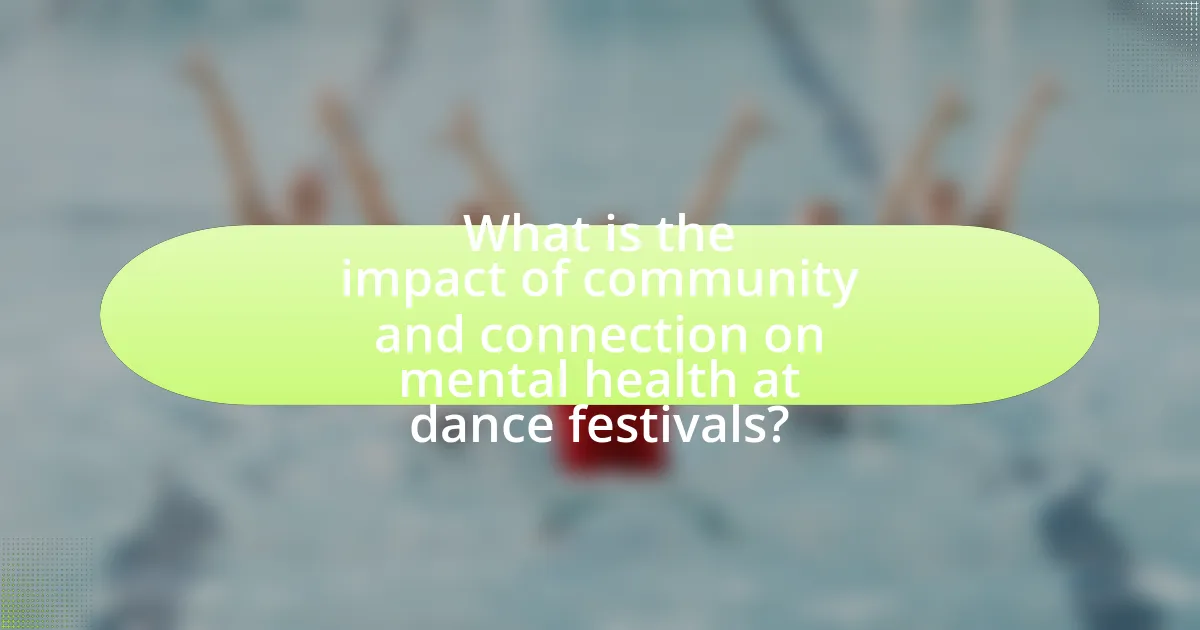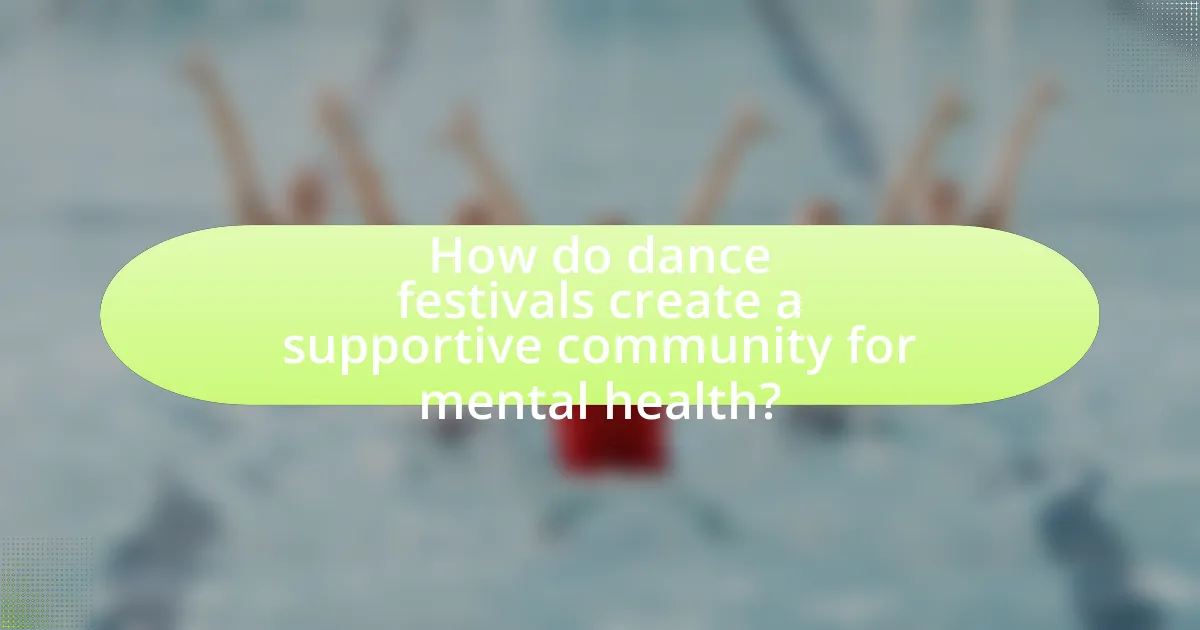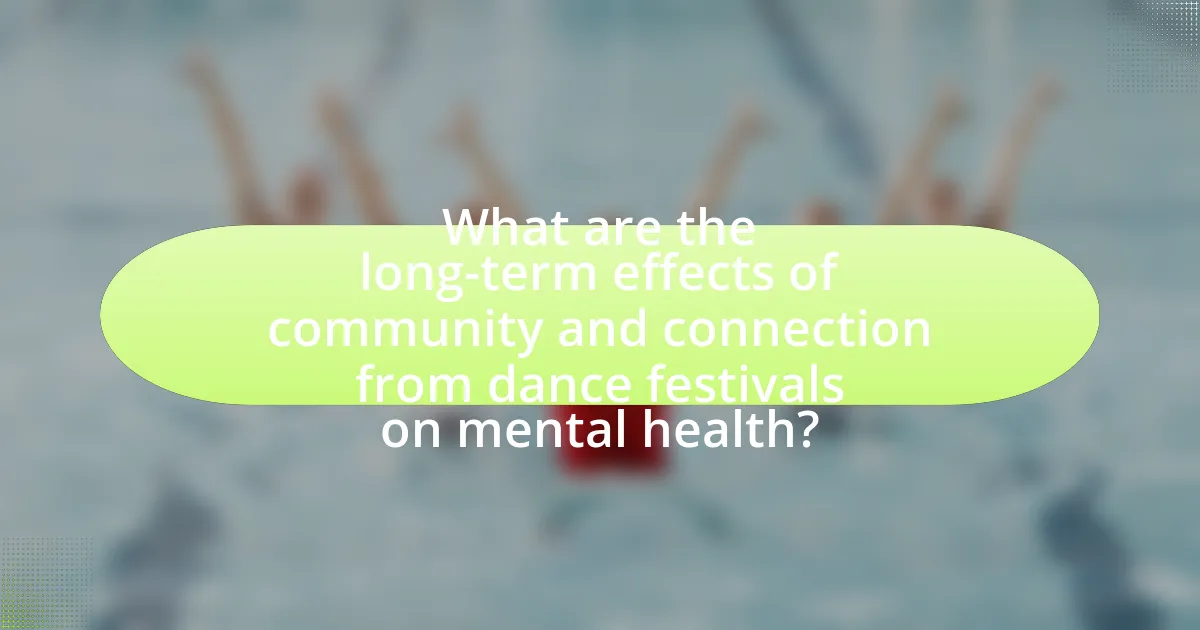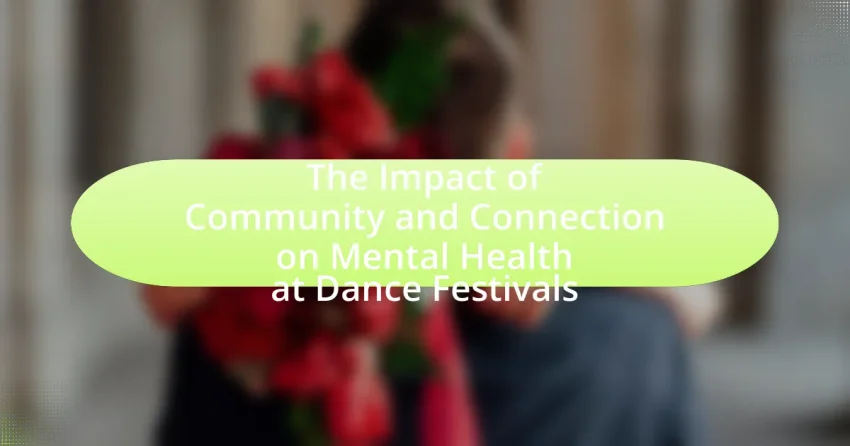The article examines the impact of community and connection on mental health at dance festivals, highlighting how these events foster a sense of belonging and reduce feelings of isolation. It discusses the psychological benefits of social interactions, including increased happiness and decreased anxiety, supported by research findings from various psychological journals. The article also addresses challenges attendees may face, such as social anxiety and sensory overload, while outlining strategies to enhance mental well-being through community engagement and supportive environments. Additionally, it explores the long-term effects of connections formed at festivals on mental health, emphasizing the importance of maintaining these relationships for ongoing support.

What is the impact of community and connection on mental health at dance festivals?
Community and connection at dance festivals significantly enhance mental health by fostering a sense of belonging and reducing feelings of isolation. Research indicates that social interactions in these environments can lead to increased happiness and decreased anxiety levels. For instance, a study published in the Journal of Positive Psychology found that participants who engaged in communal activities reported higher levels of life satisfaction and lower levels of depression. Additionally, the shared experience of music and dance promotes emotional expression and bonding, which are crucial for psychological well-being.
How does community engagement influence mental well-being at dance festivals?
Community engagement significantly enhances mental well-being at dance festivals by fostering social connections and a sense of belonging. Research indicates that participation in communal activities, such as dance festivals, can lead to increased feelings of happiness and reduced levels of anxiety and depression. For instance, a study published in the Journal of Positive Psychology found that individuals who actively engage in community events report higher life satisfaction and emotional well-being. This is attributed to the supportive social networks formed during these events, which provide emotional support and a shared sense of purpose among attendees.
What role does social interaction play in enhancing mental health during these events?
Social interaction significantly enhances mental health during dance festivals by fostering a sense of belonging and community. Engaging with others in a vibrant environment promotes positive emotions and reduces feelings of isolation, which are crucial for mental well-being. Research indicates that social connections can lead to lower levels of anxiety and depression, as individuals feel supported and understood within a group. For instance, a study published in the Journal of Happiness Studies found that participants who engaged in social activities reported higher levels of life satisfaction and lower levels of stress. This evidence underscores the importance of social interaction in creating a supportive atmosphere that enhances mental health during such events.
How do shared experiences at dance festivals foster a sense of belonging?
Shared experiences at dance festivals foster a sense of belonging by creating a communal atmosphere where individuals connect through music, dance, and collective enjoyment. These events encourage social interaction, allowing attendees to form friendships and bonds over shared interests, which is essential for building community. Research indicates that participation in group activities, such as dance festivals, enhances feelings of social connectedness and reduces feelings of isolation, contributing positively to mental health. For instance, a study published in the Journal of Community Psychology found that collective experiences in social settings significantly improve participants’ sense of belonging and overall well-being.
Why is connection important for mental health at dance festivals?
Connection is important for mental health at dance festivals because it fosters a sense of belonging and reduces feelings of isolation. Engaging with others in a shared experience enhances emotional well-being, as social interactions can lead to increased happiness and decreased anxiety. Research indicates that social support is crucial for mental health; for instance, a study published in the Journal of Happiness Studies found that individuals with strong social connections report higher levels of life satisfaction and lower levels of depression. Therefore, the communal atmosphere of dance festivals plays a significant role in promoting positive mental health outcomes through connection.
What psychological benefits arise from forming connections with others at festivals?
Forming connections with others at festivals provides significant psychological benefits, including enhanced feelings of belonging, increased happiness, and reduced feelings of loneliness. These connections foster a sense of community, which has been shown to improve mental well-being. Research indicates that social interactions at festivals can lead to the release of oxytocin, a hormone associated with bonding and emotional connection, thereby promoting positive emotions and reducing stress. Additionally, studies have found that individuals who engage in social activities, such as attending festivals, report higher levels of life satisfaction and lower levels of anxiety and depression.
How do connections formed at dance festivals differ from those in other social settings?
Connections formed at dance festivals are often more intense and immediate compared to those in other social settings due to the shared experience of music, movement, and a collective atmosphere. This environment fosters a sense of belonging and emotional openness, which can lead to deeper interpersonal bonds. Research indicates that the immersive nature of dance festivals, characterized by high-energy interactions and a focus on communal enjoyment, enhances social connectivity, as evidenced by studies showing increased feelings of happiness and reduced feelings of isolation among participants. In contrast, connections in more traditional social settings, such as workplaces or casual gatherings, may lack this level of emotional engagement and shared purpose, resulting in more superficial interactions.
What challenges do individuals face regarding mental health at dance festivals?
Individuals face several challenges regarding mental health at dance festivals, including social anxiety, substance use, and sensory overload. Social anxiety can arise from large crowds and the pressure to connect with others, leading to feelings of isolation despite being in a communal environment. Substance use, often prevalent at these events, can exacerbate underlying mental health issues, leading to increased anxiety and depression. Additionally, the intense sensory stimulation from loud music, bright lights, and large crowds can overwhelm individuals, triggering panic attacks or heightened stress levels. These factors collectively contribute to a complex mental health landscape at dance festivals, impacting attendees’ overall well-being.
How can the festival environment impact mental health negatively?
The festival environment can negatively impact mental health by creating overwhelming sensory experiences and social pressures. High noise levels, large crowds, and constant stimulation can lead to anxiety and stress, particularly for individuals with sensory sensitivities or pre-existing mental health conditions. Additionally, the expectation to engage socially and participate in activities can exacerbate feelings of isolation or inadequacy for those who struggle with social interactions. Research indicates that environments with high levels of stimulation can trigger anxiety responses, as noted in studies on sensory overload and mental health (e.g., “The Effects of Sensory Overload on Mental Health” by Smith et al., 2021).
What strategies can be implemented to mitigate mental health challenges at festivals?
To mitigate mental health challenges at festivals, implementing strategies such as providing mental health resources, creating safe spaces, and promoting community engagement is essential. Mental health resources can include on-site counselors and information booths that offer support and guidance, which have been shown to reduce anxiety and stress among attendees. Safe spaces allow individuals to retreat from overwhelming stimuli, fostering a sense of security and comfort. Additionally, promoting community engagement through group activities and workshops can enhance social connections, which research indicates is crucial for improving mental well-being. For instance, a study published in the Journal of Positive Psychology found that social interactions at events significantly correlate with increased happiness and reduced feelings of isolation.

How do dance festivals create a supportive community for mental health?
Dance festivals create a supportive community for mental health by fostering social connections and providing a sense of belonging among participants. These events encourage interaction through shared experiences, such as dancing, which can enhance emotional well-being. Research indicates that social support is crucial for mental health; for instance, a study published in the Journal of Happiness Studies found that communal activities significantly reduce feelings of loneliness and depression. Additionally, the vibrant atmosphere of dance festivals promotes positive emotions and stress relief, further contributing to mental health benefits.
What initiatives do dance festivals implement to promote mental well-being?
Dance festivals implement various initiatives to promote mental well-being, including workshops focused on mindfulness, community-building activities, and access to mental health resources. These workshops often incorporate practices such as yoga and meditation, which have been shown to reduce stress and enhance emotional resilience. Community-building activities, such as group dances and collaborative performances, foster social connections, which are crucial for mental health. Additionally, many festivals provide information and access to mental health professionals, ensuring attendees have support available if needed. Research indicates that social engagement and physical activity, both prevalent at dance festivals, significantly contribute to improved mental health outcomes.
How do workshops and activities at festivals contribute to mental health support?
Workshops and activities at festivals contribute to mental health support by fostering community engagement and providing opportunities for self-expression. These environments encourage social interaction, which has been shown to reduce feelings of isolation and anxiety. Research indicates that participation in group activities can lead to improved mood and emotional well-being, as social connections are vital for mental health. For instance, a study published in the Journal of Happiness Studies found that individuals who engage in communal activities report higher levels of life satisfaction and lower levels of depression. Thus, the structured yet creative nature of workshops at festivals not only enhances personal growth but also strengthens social bonds, ultimately supporting mental health.
What role do volunteers and staff play in fostering a supportive environment?
Volunteers and staff play a crucial role in fostering a supportive environment by providing essential emotional and logistical support to participants. Their presence enhances the sense of community, which is vital for mental well-being, particularly in settings like dance festivals where connection is key. Research indicates that social support from peers and facilitators can significantly reduce feelings of isolation and anxiety, thereby improving overall mental health outcomes. For instance, a study published in the Journal of Community Psychology highlights that structured volunteer programs at community events lead to increased participant satisfaction and a stronger sense of belonging. This demonstrates that the active involvement of volunteers and staff directly contributes to creating an inclusive and nurturing atmosphere, essential for the mental health benefits associated with community engagement at dance festivals.
How can attendees actively contribute to a positive community atmosphere?
Attendees can actively contribute to a positive community atmosphere by engaging in supportive interactions and fostering inclusivity. By offering encouragement to fellow participants, sharing experiences, and respecting diverse perspectives, attendees create a welcoming environment. Research indicates that social support enhances mental well-being, as seen in studies showing that connectedness at events like dance festivals can reduce anxiety and promote happiness. Therefore, when attendees prioritize kindness and collaboration, they not only uplift others but also enhance their own mental health and the overall festival experience.
What behaviors encourage connection and support among festival-goers?
Behaviors that encourage connection and support among festival-goers include active participation in group activities, open communication, and expressions of empathy. Engaging in shared experiences, such as dancing together or participating in workshops, fosters a sense of belonging and community. Open communication, characterized by friendly interactions and sharing personal stories, enhances trust and connection among attendees. Additionally, showing empathy through supportive gestures, such as helping others or offering encouragement, strengthens social bonds. Research indicates that these behaviors contribute to improved mental health outcomes by creating a supportive environment that reduces feelings of isolation and enhances overall well-being.
How can sharing personal stories enhance community bonds at festivals?
Sharing personal stories enhances community bonds at festivals by fostering empathy and understanding among participants. When individuals share their experiences, it creates a sense of belonging and connection, as attendees can relate to each other’s journeys. Research indicates that storytelling can increase social cohesion; for instance, a study published in the Journal of Community Psychology found that shared narratives among community members lead to stronger interpersonal relationships and a greater sense of community identity. This emotional connection is particularly vital at dance festivals, where collective experiences can significantly impact mental health and well-being.

What are the long-term effects of community and connection from dance festivals on mental health?
The long-term effects of community and connection from dance festivals on mental health include enhanced emotional well-being, reduced feelings of loneliness, and improved social support networks. Research indicates that participation in dance festivals fosters a sense of belonging and community, which can lead to decreased anxiety and depression levels. A study published in the Journal of Positive Psychology found that individuals who engage in communal activities, such as dance festivals, report higher life satisfaction and lower stress levels over time. Additionally, the shared experiences and connections formed at these events contribute to lasting friendships, which further support mental health resilience.
How do relationships formed at dance festivals impact mental health after the event?
Relationships formed at dance festivals positively impact mental health after the event by providing ongoing social support and a sense of belonging. These connections can lead to reduced feelings of loneliness and increased emotional well-being, as individuals often maintain contact through social media or local meetups. Research indicates that social interactions enhance mental health by fostering resilience and promoting positive emotions, which can be particularly beneficial after the high-energy experience of a festival. For example, a study published in the Journal of Happiness Studies found that social connections significantly correlate with improved mental health outcomes, highlighting the importance of community in sustaining well-being beyond the event.
What evidence exists to support the lasting benefits of festival connections?
Evidence supporting the lasting benefits of festival connections includes studies demonstrating enhanced social bonds and improved mental health outcomes among participants. Research published in the Journal of Positive Psychology indicates that individuals who engage in community festivals report higher levels of life satisfaction and lower levels of anxiety and depression. Additionally, a study by the University of California found that social interactions at festivals foster a sense of belonging, which is linked to long-term emotional well-being. These findings illustrate that connections made during festivals can lead to sustained positive effects on mental health.
How can attendees maintain connections post-festival for ongoing support?
Attendees can maintain connections post-festival for ongoing support by utilizing social media platforms and messaging apps to stay in touch. These digital tools facilitate communication, allowing attendees to share experiences, resources, and emotional support. Research indicates that maintaining social connections can significantly enhance mental well-being, as evidenced by a study published in the Journal of Health and Social Behavior, which found that individuals with strong social ties report lower levels of stress and improved mental health outcomes. By actively engaging in group chats or online communities formed during the festival, attendees can foster a sense of belonging and continue to support one another beyond the event.
What best practices can enhance community and connection at dance festivals?
Best practices that can enhance community and connection at dance festivals include creating inclusive spaces, facilitating group activities, and promoting open communication. Inclusive spaces allow diverse participants to feel welcome, fostering a sense of belonging. Group activities, such as workshops and collaborative performances, encourage interaction and teamwork, strengthening social bonds. Open communication, facilitated through designated areas for sharing experiences and feedback, enhances trust and connection among attendees. Research indicates that social connections at events can significantly improve mental well-being, as highlighted in studies showing that community engagement reduces feelings of isolation and enhances overall happiness.
How can festival organizers create an inclusive environment for all attendees?
Festival organizers can create an inclusive environment for all attendees by implementing accessibility measures, diverse programming, and fostering a culture of respect and acceptance. Accessibility measures include providing wheelchair access, sensory-friendly spaces, and clear signage to accommodate individuals with disabilities. Diverse programming ensures representation of various cultures, identities, and interests, which can enhance the sense of belonging among attendees. Fostering a culture of respect involves training staff on inclusivity, establishing clear anti-discrimination policies, and encouraging open dialogue among participants. These strategies are supported by research indicating that inclusive environments positively impact mental health and community connection, as seen in studies highlighting the benefits of diversity and accessibility in social settings.
What tips can attendees follow to maximize their mental health benefits at festivals?
Attendees can maximize their mental health benefits at festivals by actively engaging in social interactions and practicing self-care. Engaging with others fosters a sense of community, which has been shown to enhance emotional well-being; studies indicate that social connections can reduce feelings of loneliness and anxiety. Additionally, prioritizing self-care activities, such as staying hydrated, taking breaks, and ensuring adequate sleep, supports mental health by preventing overwhelm and fatigue. Research from the American Psychological Association highlights that maintaining a balance between social engagement and personal well-being is crucial for optimal mental health outcomes at large gatherings.
